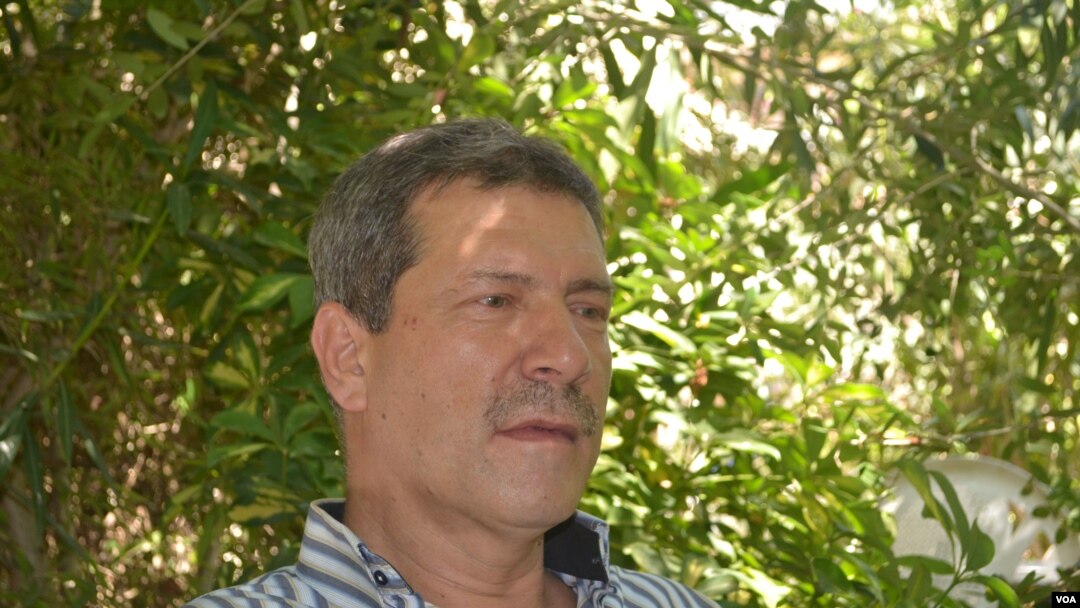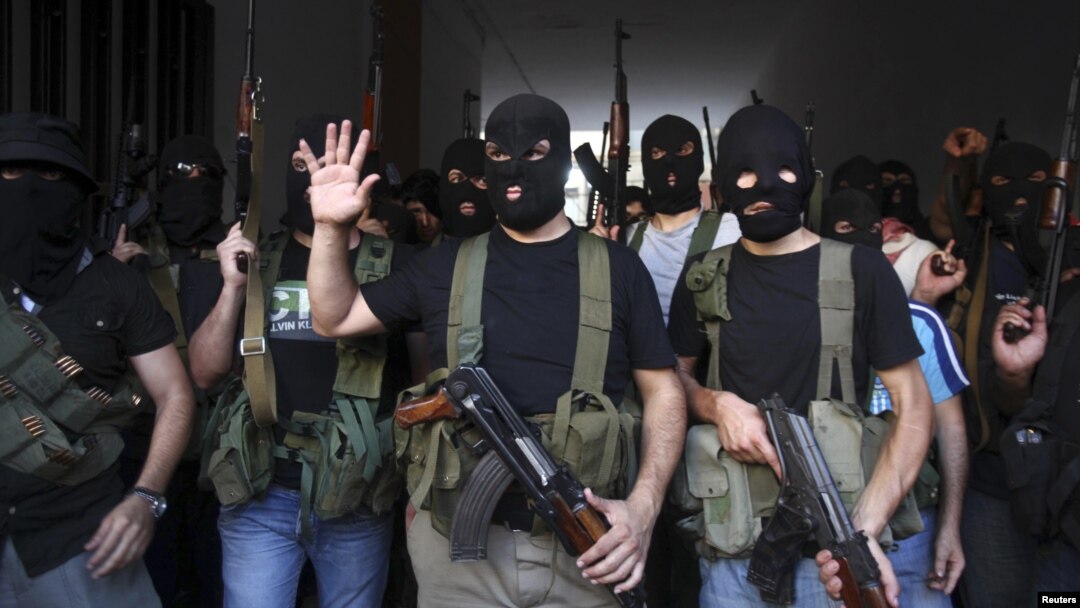BEIRUT, Lebanon — The Lebanese clan that kidnapped dozens of Syrians and a Turkish businessman last week in a bid to get a captured relative freed in Syria, says it will allow more time for government efforts to free the relative before it takes further action. The kidnappings stoked fears that Lebanon is being drawn further into the Syrian conflict.
In May, 11 Shi'ite Muslim pilgrims from Lebanon were kidnapped in Syria and are believed to still be in the city of Azaz, which recently came under heavy government shelling.
Then, last week, the Mekdad clan, a prominent family in Beirut's Shi'ite southern suburbs, snatched dozens of Syrians and a 28-year old Turkish businessman. The family acted after clan member Hassan Salim Mekdad was shown beaten and bruised on Arabic TV, and confessed to being a member of Lebanon's political/militant faction Hezbollah and a fighter in Syria.
Drastic actions
Family spokesman Maher Mekdad denied that his relative has ties to Hezbollah. He said 40-year-old Hassan, a bank employee, went to Syria weeks before the uprising began last year because he had legal problems with his employer and sought to escape arrest in Lebanon.

“We know the only way to get Hassan is to put pressure on the FSA [Free Syrian Army]. The Syrian citizens, if you kidnap a thousand, it's not going to [make any] effect," said Mekdad. "But one Turki, yes, it affects, because Turkish elections are next year, and that's going to affect [Prime Minister] Erdogan and the opposition in Turkey. That's why we took this decision.”
Sitting in his garden, Mekdad told VOA that the family continues to hold the Turkish businessman and about 20 Syrians. They released at least 20 other Syrians last week. He turned down this reporter's request to meet some of the hostages, saying he did not know where they are, only that they are being held in Beirut's southern suburbs.
Specter of war rises
The kidnappings have resurrected grim memories of Lebanon's 1975-1990 civil war, during which hundreds of people, including Westerners, were abducted, many never to be seen again.
After a Mekdad family member told reporters the clan would next target Saudis and Qataris for their countries' assistance to Syrian rebels holding Hassan, Gulf Arab governments urged their citizens to leave Lebanon immediately. That abruptly ended an already slow summer tourist season that depends on free-spending Gulf visitors.
Paul Salem, director of the Carnegie Endowment's Middle East Center, said the kidnappings are a dangerous development for Lebanon.
“Kidnappings were one of the ways that the Lebanese civil war gained steam, unfortunately, and it's one of the ways that civil wars all over the world gather steam, and things get very quickly out of hand," said Salem. "Luckily, we have a bit of a lull now, an initial escalation has quieted somewhat. Certainly the faster abductees of all sides are released, certainly the better it is for Lebanon. It's a very dangerous turn of events.”
Momentum
As fears were growing that the Mekdads would take more hostages, Maher Mekdad announced Thursday the family would wait for the results of negotiation efforts by a Lebanese Cabinet crisis committee before taking further action.
Mekdad said he believes the kidnapping drama will end soon, hinting that he thinks his relative will be released in the coming days. He has a clear message to the Turkish government, though, who he believes is pivotal for a successful resolution.
“Put pressure on the FSA. Release Hassan and you will take your citizen back home. [It is] That simple," he urged. "It is not a game. We are not playing a game. We need Hassan back home. We are not going to wait another four months and nobody listens to us, as what happened with the 11 hostages.”
As for the Lebanese government, he said, it should take better care of its citizens and not abandon them to take care of themselves.
In May, 11 Shi'ite Muslim pilgrims from Lebanon were kidnapped in Syria and are believed to still be in the city of Azaz, which recently came under heavy government shelling.
Then, last week, the Mekdad clan, a prominent family in Beirut's Shi'ite southern suburbs, snatched dozens of Syrians and a 28-year old Turkish businessman. The family acted after clan member Hassan Salim Mekdad was shown beaten and bruised on Arabic TV, and confessed to being a member of Lebanon's political/militant faction Hezbollah and a fighter in Syria.
Drastic actions
Family spokesman Maher Mekdad denied that his relative has ties to Hezbollah. He said 40-year-old Hassan, a bank employee, went to Syria weeks before the uprising began last year because he had legal problems with his employer and sought to escape arrest in Lebanon.

Family spokesman Maher Mekdad, for the Mekdad clan, a family in Beirut's Shi'ite southern suburbs that has snatched dozens of Syrians and a Turkish businessman in an effort to free a captured relative in Syria, Aug. 23, 2012. (VOA - M. Besheer)
As for the kidnappings, he said the family felt it had no option but to take matters into its own hands because the government has not been able to free the 11 Shi'ite pilgrims held in Syria.“We know the only way to get Hassan is to put pressure on the FSA [Free Syrian Army]. The Syrian citizens, if you kidnap a thousand, it's not going to [make any] effect," said Mekdad. "But one Turki, yes, it affects, because Turkish elections are next year, and that's going to affect [Prime Minister] Erdogan and the opposition in Turkey. That's why we took this decision.”
Sitting in his garden, Mekdad told VOA that the family continues to hold the Turkish businessman and about 20 Syrians. They released at least 20 other Syrians last week. He turned down this reporter's request to meet some of the hostages, saying he did not know where they are, only that they are being held in Beirut's southern suburbs.
Specter of war rises
The kidnappings have resurrected grim memories of Lebanon's 1975-1990 civil war, during which hundreds of people, including Westerners, were abducted, many never to be seen again.
After a Mekdad family member told reporters the clan would next target Saudis and Qataris for their countries' assistance to Syrian rebels holding Hassan, Gulf Arab governments urged their citizens to leave Lebanon immediately. That abruptly ended an already slow summer tourist season that depends on free-spending Gulf visitors.
Paul Salem, director of the Carnegie Endowment's Middle East Center, said the kidnappings are a dangerous development for Lebanon.
“Kidnappings were one of the ways that the Lebanese civil war gained steam, unfortunately, and it's one of the ways that civil wars all over the world gather steam, and things get very quickly out of hand," said Salem. "Luckily, we have a bit of a lull now, an initial escalation has quieted somewhat. Certainly the faster abductees of all sides are released, certainly the better it is for Lebanon. It's a very dangerous turn of events.”
Momentum
As fears were growing that the Mekdads would take more hostages, Maher Mekdad announced Thursday the family would wait for the results of negotiation efforts by a Lebanese Cabinet crisis committee before taking further action.
Mekdad said he believes the kidnapping drama will end soon, hinting that he thinks his relative will be released in the coming days. He has a clear message to the Turkish government, though, who he believes is pivotal for a successful resolution.
“Put pressure on the FSA. Release Hassan and you will take your citizen back home. [It is] That simple," he urged. "It is not a game. We are not playing a game. We need Hassan back home. We are not going to wait another four months and nobody listens to us, as what happened with the 11 hostages.”
As for the Lebanese government, he said, it should take better care of its citizens and not abandon them to take care of themselves.


